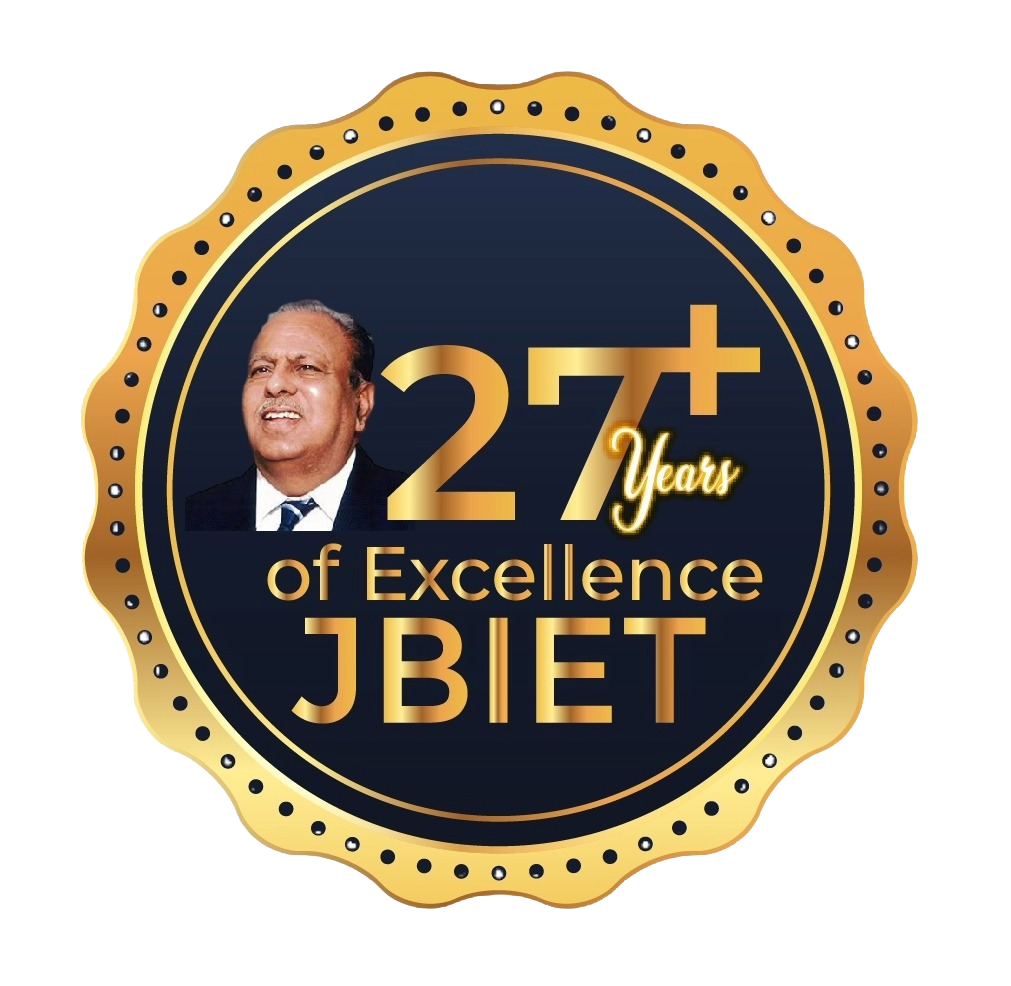Laboratories:
The laboratories in department of Electrical and Electronics Engineering are intended to give practical experience to the students. Laboratories are useful for students to implement the theory in practical aspects and helps student to apply their knowledge of theory for various courses of their course outcomes. EEE is equipped with highly developed hardware and software labs, that have superior quality and sophisticated equipment and trainer kits that allows students to design, implement and think beyond horizon. EEE finds its application both in hardware and software these days. Most of the experiments are conducted using both hardware and software tools. All the laboratories are equipped with variety of software tools which are necessity of today’s industrial requirement. The department has its own computer laboratory, possessing computers of Intel Pentium i3/i5 processors
DC Machines Lab
|
SNO |
NAME OF LABORATORIES |
|
1 |
DC Machines Lab |
|
2 |
AC Machines Lab |
|
3 |
Electrical Simulation Lab-I |
|
4 |
Electrical Simulation Lab-II |
|
5 |
Power Electronics Lab |
|
6 |
Electrical circuits Lab |
|
7 |
Electrical Measurements and Instrumentation Lab |
|
8 |
Control Systems Lab |
|
9 |
Power Systems Lab |
|
10 |
Basic electrical and engineering -I |
|
11 |
Basic electrical and engineering lab-II |
|
12 |
Research and development lab |
|
13 |
Project lab |
DC Machines Lab
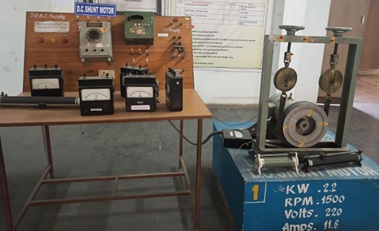
The objective of the DC Machines Laboratory is to impart knowledge about characteristics and behavior of the DC Machines, operation of DC machines and give them experimental skill, familiarize with the constructional details of different types, working principle and their performance. It also provides the essential facilities to the students to augment their concepts about the fundamentals of rotating machines. It is well equipped lab to provide experimental and hands-on experience to the detailed study of characteristic and operational aspects of DC electrical machines. Facilities: DC Shunt Motor - Generator Set, DC Shunt Motor - Series Generator Set DC Shunt Motor - Compound Generator, Identical DC Shunt Machines, Identical DC Series Machines, DC Shunt Motor)
AC Machines Lab
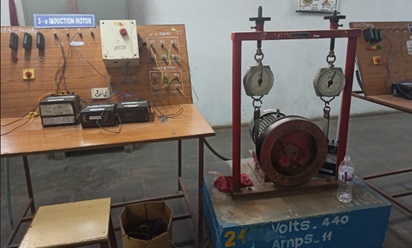
AC Machines laboratory is designed for students to perform experiments on transformers, Inductions motors and Synchronous machines. The main objective of this laboratory is to impart knowledge about characteristics and behavior of the AC Machines, operation of transformers, synchronous and Asynchronous machines and give them experimental skill, familiarize with the constructional details of different types, working principle and their performance. This lab consists of machines and all are mounted in industrial type of assembly to give the students industrial Facilities: Single phase transformer, three phase transformer, Induction Motors , three phase synchronous motor , Alternator Sets and drives
Software Laboratories
Electrical Simulation Lab
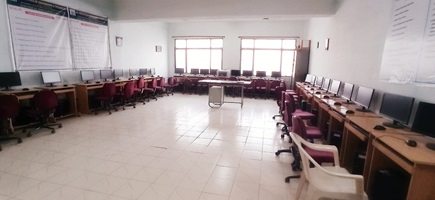
Simulation laboratory is designed to familiarize students with the circuit models and simulation techniques. The interactive experiments in this lab will give the students an opportunity for learning and better understanding of basic concepts of simulation with MATLAB/PSICE for the analysis of various models which are aligned with Control systems, Power Systems and Power Electronics subjects. This lab is providing a learning platform for both students and faculty. The facility has been utilized by B.Tech and M.Tech students.
|
Computer Configuration |
|
|
Processor: |
ACER Intel Core i3 6100 Processor |
|
Ram: |
4 GB Memory |
|
Hard Disk: |
500 GB Hard Disk |
|
Chipset: |
H1 10 Chipset |
|
Monitor: |
18.5 WTFT LED Display |
|
Smps: |
250W SMPS |
|
Keyboard: |
PS/2 Keyboard |
|
Mouse: |
PS/2 Mouse |
|
MATLAB Configuration |
|
|
Software |
MATLAB 2016b |
|
Tool Boxes |
a) Simulink |
|
b) SimScape |
|
|
c) Power System |
|
|
d) Control System |
|
|
PSPICE Configuration |
|
|
Software |
Pspice: Cadence Release 17.2 |
|
Orcad University Bundle |
|
|
|
|
|
|
|
|
|
Power Electronics Lab
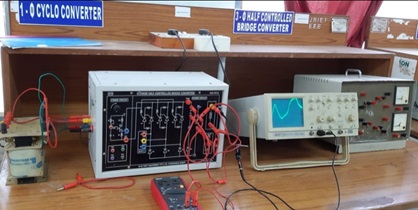
The objective of the Power Electronics laboratory is to study the characteristics of switching devices and its applications in rectifiers, AC voltage controllers, inverter and choppers. It also acquaint with the application of electronic devices for conversion, control and conditioning of electric power. Further it aids the students to acquire an overview of different types of power semiconductor devices and to cognize the operation, characteristics and performance parameters of controlled rectifiers. The principle of operation, switching techniques, modulation techniques and harmonic reduction techniques in PWM inverters are studied in the lab. . The lab facilitates faculty and students who are conducting research, industry sponsored projects in power converters in particular and electrical energy conversion in general. Facilities: Silicon controlled rectifier, TRAIC, DIAC, MOSFET and IGBT Characteristics study unit, Operational Amplifier Trainer, DC Chopper power unit, UJT firing circuit, Forced Commutation study unit, fully controlled converter power circuit.
Electrical circuits
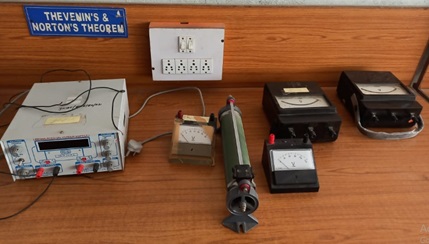
The Electrical Circuits Laboratory assists the students to impart with essential knowledge of electrical and electronic circuit design and analysis and provide hands on experience to design different electrical and electronic circuits with bread boards and with different active and passive components. This Lab gives the practical learning and use of various instruments like Millimeter, Oscilloscopes, Function Generators, Wattmeter’s etc. Along with this, they do practical verification of various electrical theorems, Tests on Transformer, measurement of power in three phase circuits using wattmeter etc. Facilities: Regulated power supply, Cathode ray oscilloscope, Function Generators
Electrical Measurements and Instrumentation Lab
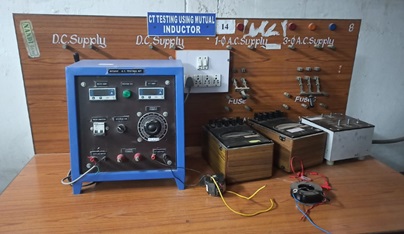
The aim of the Electrical Measurements Laboratory is to reinforce the students with an adequate work experience in the measurement of different quantities and also to expertise in handling the instruments involved. The basic operations of equipment and the process where it might be used, practically realized in the laboratory. It also provides facilities to train the students in the measurement of displacement, resistance, inductance, voltage, current, power, power factor etc., and to give exposure to AC, DC bridges and transient measurement. These instruments and circuits are then implemented in various projects and real time applications.
Facilities: Transformer oil testing set up, Single Phase Energy Meter , DC Potentiometer, Kelvin’s Double Bridge, Schering and Anderson’s Bridge, Current Transformers ,PTS, Strain Guage Kit, LVDT Kit, Dynamometer power factor meter, Resistance ,voltage and current measurement set ups, watt meters.
Control Systems Lab
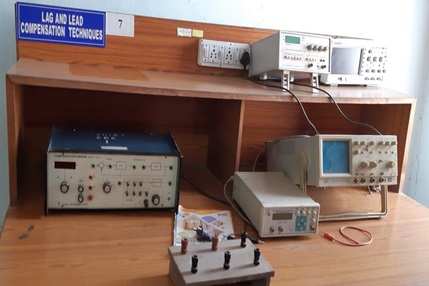
The aim of the Control Systems laboratory is to provide sound knowledge in the basic concepts of linear control theory and design of control systems, to understand the methods of representation of systems and getting their transfer function models. It facilitates basic knowledge in obtaining the open loop and closed loop responses to understand the concept of stability of control systems. It also helps the students to study the compensation design for a system. Facilities: Linear System Simulator Kit PLC Trainer Units, PID Controller Trainer Kit, Temperature Control System Study Kit, Servo Motor, PCs
Power Systems Lab
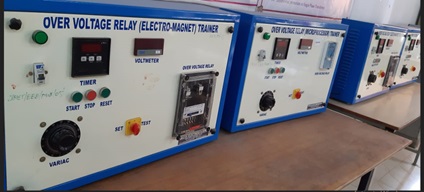
This laboratory is designed to give students hands-on experience on different equipment of electrical power system. This is an advanced laboratory to carry out modeling, simulation and analysis of power system equipments. Students can practically verify several concepts and procedures learned in power system modeling and analysis. This lab has facilities to study the protection of equipment by relays in conjunction with switchgear. This lab also helps to model and analyze the dynamics of power system for small signal and large signal disturbances and design the systems for enhancing stability. It familiarizes with the preparatory work necessary for meeting the next day’s operation and the various control actions to be implemented on the system to get an overview of system operation and control, to understand and model power-frequency dynamics and to design power-frequency controller, to understand and model reactive power-voltage interaction and different methods of control for maintaining voltage profile against varying system.
Basic Electrical and Engineering –I, Basic Electrical and Engineering Lab-II
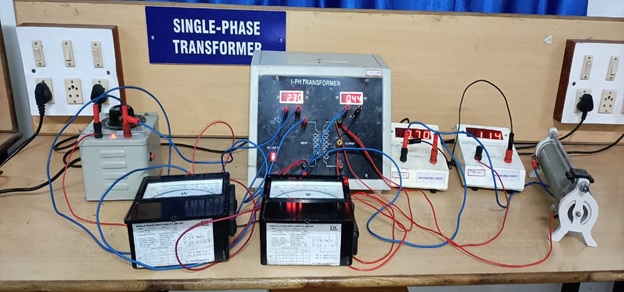
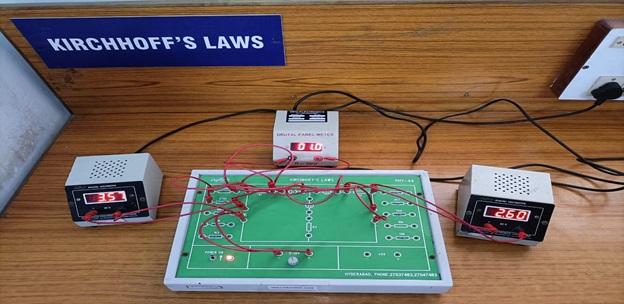
The Basic Electrical Engineering Lab is well equipped to provide practical exposure to the students in order to understand the basic principles of electrical engineering. This Lab emphasizes the operation of various electrical networks and electrical machines. The outcome of the laboratory is to get an exposure to basic electrical laws, understand the response of different types of electrical circuits to different excitations, the basic characteristics and applications of various electrical machines. Facilities: Experimental Kits, Single Phase Transformer, DC Shunt Motor, Three-phase Induction Motor
Research And Development Lab
SOLAR PV SYSTEM
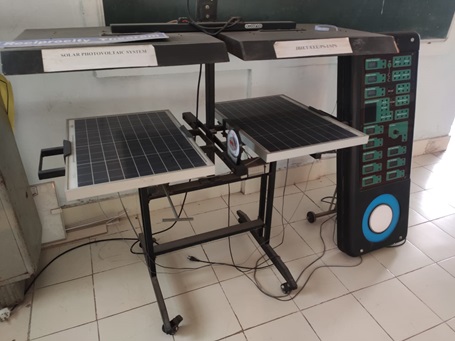
It covers the fundamentals about voltage and current variation
of solar PV system as well as basic research on PV system and related electronics which would be helpful to the engineering students of both undergraduate and postgraduate level. It will be useful for research students.
It focuses on the characteristics of PV module at different conditions and also on the characteristics of PV systems. All the experiments can be done with the help of digital display meters but some of these can also be performed with logger/plotter unit.
SOLAR THERMAL SYSTEMS
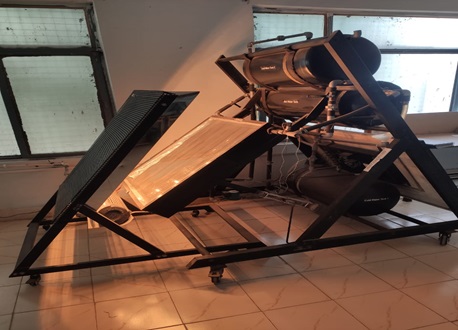
Solar Thermal is one of the simplest Theory and basic technologies in the solar energy A typical flat-plate collector consists of field. Collector is the heart of any solar an absorber plate in an insulated box water heating system. It absorbs and together with transparent cover sheet() converts the solar energy into heat and then transfers that heat to a stream of Work and properties of different water. There are different types of solar components of a flat plate collector energy collector. In our system we have used a flat plate collector.

